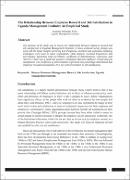| dc.contributor.author | Picho, Epiphany Odubuker | |
| dc.date.accessioned | 2018-06-18T13:51:50Z | |
| dc.date.available | 2018-06-18T13:51:50Z | |
| dc.date.issued | 2014 | |
| dc.identifier.citation | Picho, Epiphany Odubuker (2014). The relationship between employee reward and job satisfaction in Uganda Management Institute: an empirical study. The Ugandan Journal of Management and Public Policy Studies 7(1). https://www.academia.edu/14073353/The_relationship_between_employee_reward_and_job_satisfaction_in_Uganda_Management_Institute_an_empirical_study | en_US |
| dc.identifier.issn | 20787 049 | |
| dc.identifier.uri | https://www.academia.edu/14073353/The_relationship_between_employee_reward_and_job_satisfaction_in_Uganda_Management_Institute_an_empirical_study | |
| dc.description.abstract | The purpose of the study was to assess the relationship between employee reward and job satisfaction in Uganda Management Institute. A cross-sectional survey design was used with the target sample size being 118. Purposive, stratified and systematic sampling techniques were used to select respondents. Data analysis involved frequencies and percentages, Spearman rank correlation, coefficient of determination, regression, and ANOVA. There was a moderate positive correlation between employee reward and job satisfaction. The coefficient of determination expressed into percentage determined that employee reward accounted for 29.3 per cent of variation in job satisfaction. | en_US |
| dc.language.iso | en | en_US |
| dc.publisher | The Ugandan Journal of Management and Public Policy Studies | en_US |
| dc.relation.ispartofseries | Vol.7;No.1 | |
| dc.subject | Human Resources Management | en_US |
| dc.subject | Reward | en_US |
| dc.subject | Job Satisfaction | en_US |
| dc.subject | Uganda Management Institute | en_US |
| dc.title | The relationship between employee reward and job satisfaction in Uganda Management Institute: an empirical study | en_US |
| dc.type | Article | en_US |

